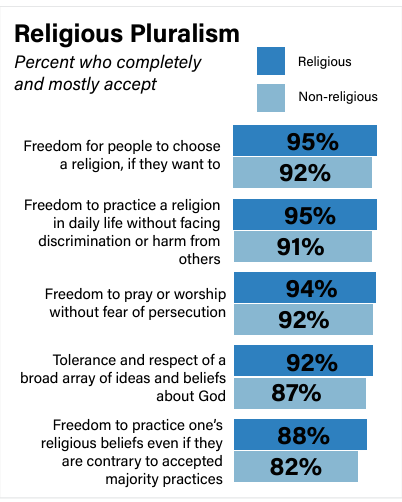 [1]
[1]WASHINGTON (BP) — More than 90 percent of American adults support religious pluralism, the Becket Fund for Religious Liberty found in its latest Religious Freedom Index, contrary to acts of religious hatred and intolerance amid the Israel-Hamas War.
In other findings, 59 percent of respondents viewed religion as part of the solution to America’s problems, up 9 percentage points from the previous year; 67 percent said parents should be able to opt their children out of public education classes they find morally or religiously objectionable, and Gen Z is more accepting than others of religious clothing and religious days off in the workplace.

Regarding religious pluralism, 94 percent said people should be able to choose a religion of their choice and to practice their religion in daily life without discrimination or harm from others, Becket said Sept. 16 in the poll conducted in the week immediately preceding Hamas’ attack on Israel.
Nearly as many, 90 percent, expressed tolerance and respect for a broad array of beliefs and ideas about God; with 86 percent saying people should be free to express their faith even if it is contrary to popular practices, such as not consuming alcoholic beverages or certain foods, or wearing religious specific clothing.
Acts of anti-Semitism rose 388 percent in the beginning weeks of the Israel-Hamas War, according to statistics from the Anti-Defamation League (ADL), including physical assaults and violent online messages. Acts of violence against Muslim, Palestinian and Arab Americans also rose, ADL said, noting several crimes including the Oct. 14th murder of an 8-year-old Palestinian boy in Illinois, and the shooting of three Palestinian college students who were walking near the University of Vermont campus. Two of the students were wearing kaffiyehs, headdresses traditionally worn in the Middle East.
In its fifth edition of the annual index, Becket polled respondents in six dimensions of religious freedom, including religious pluralism, religion and policy, religious sharing, religion and society, church and state, and religion in action.
Becket’s composite religious freedom index of the findings rate Americans’ support of religious liberty at 69 on a scale of 0-100, with religious pluralism rating highest at 84, followed by religious sharing (sharing one’s faith outside the home or places of worship), 72; religion in action (practicing one’s beliefs outside the home or places of worship), 68; religion and policy (considering how religion should intersect law and public policy), 66; religion in society (looking at religion’s contributions to society), 65; and church and state (addressing the boundaries between religion and the government), 59.
“This year, our findings indicate that American support for religious freedom is coming back strong after a COVID-era slump,” Becket said in its executive summary. “This year’s results also show ways in which younger Americans’ ideas of religious freedom are different – both in ways that are positive and more concerning,” Becket said in its executive summary.”
Becket highlighted key findings of the report, citing that 88 percent of Americans favor the Religious Freedom Restoration Act (RFRA) or an even higher standard of religious freedom. The RRFA prevents the federal government from burdening religious freedom without a compelling reason, and requires the government to choose the option least restrictive of religious freedom.
Regarding a specific case pending in federal court on the protection of Native American sacred sites, Apache Stronghold v. United States, pollsters found 73 percent of Americans strongly or somewhat support protecting such sites.
As society grapples with LGBTQ pronouns, pollsters found 58 percent of Americans disagree with school policies requiring employees and students to use a person’s preferred pronoun, up from 46 percent in 2021.
Among other specific findings:
- 58 percent of Gen Z said employees should be free to wear religious clothing at work and refuse to work on religious holidays aligning with their religion; while only 28 percent of baby boomers said so.
- 49 percent of Gen Z said employees should be allowed to refuse to do work that violates their religious belief, more than 10 points higher than baby boomers (38 percent) who voiced the lowest acceptance for such freedom.
- 65 percent said religious groups or organizations should be free to make their own employment and leadership decisions without government interference.
- 76 percent said religious service organizations including soup kitchens and homeless shelters should be eligible for government financial support.
- 53 percent said the government should be allowed to display religious symbols or language publicly.
Heart+Mind Strategies conducted the survey Sept. 28-Oct. 5, 2023 using an online panel of 1,000 adults assembled by Dynata.
–30–
